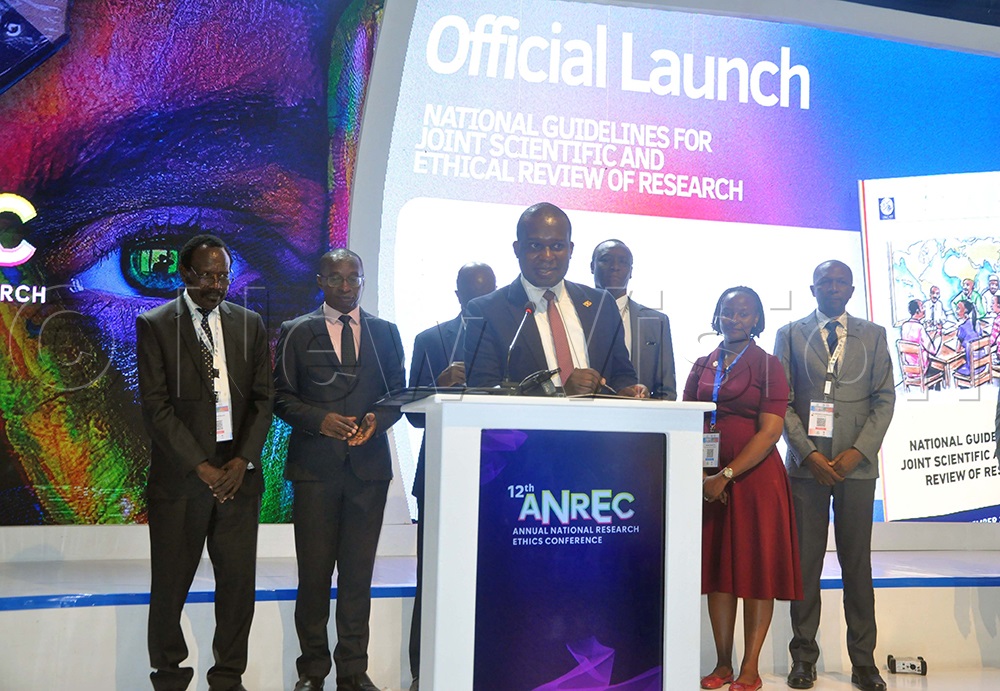Uganda’s researchers urged not to ignore community voices in scientific research
Researchers were urged to treat local communities as active partners rather than passive subjects and to make research a collaborative, participatory process that addresses people’s real health, economic, social and wellbeing challenges.
Officials and participants during the opening and launch of research guidelines at the 12th Annual National Research Ethics Conference at Hotel Africana. (Photo by John Odyek)
___________________
The 12th Annual National Research Ethics Conference (ANREC) has opened in Kampala with a call for Uganda’s scientists to place community voices at the centre of research.
Researchers were urged to treat local communities as active partners rather than passive subjects and to make research a collaborative, participatory process that addresses people’s real health, economic, social and wellbeing challenges.
The two-day conference, held under the theme “Communities as Partners: Strengthening Community Engagement in Research,” is spearheaded by the Uganda National Council for Science and Technology (UNCST) at Hotel Africana.
Delivering the keynote address on October 22, 2025, Dr Janestic Twikirize from Makerere University’s College of Humanities and Social Sciences emphasised that research must respond to community needs.
“Research should solve real community problems rather than imagined ones,” she said. “Ethics in research means respecting relationships and having the desire to do good for communities. You get accurate and valid data when people trust and respect you. The balance of power between researchers and communities must be shared.”
Dr Twikirize called for a shift from doing research on communities to doing research with communities, saying this approach acknowledges that communities possess valuable knowledge and resources.
“Research design should begin from the bottom up not from offices. Use participatory methods, listen to communities. Responsive research goes beyond consent; it promotes voice, agency and recognition of community assets,” she said.
She warned against tokenistic consultations, urging researchers to create genuine mechanisms for community input and decision-making.
“Pay attention to who is likely to be excluded or vulnerable. Who is informing the research process? Communities must understand the purpose of the research,” she added.
Twikirize highlighted challenges in research dissemination, noting that results are often shared only in high-ranking journals inaccessible to the very communities involved.
She raised issues of data ownership, patents and community representation, saying that exclusion perpetuates isolation, poverty and stigma.
She urged researchers to translate their findings into tangible community benefits and to be mindful of power imbalances between academics and the people they study.
“Be aware of the power you hold. Donor-driven research agendas can overshadow local realities. We need decolonial attitudes, avoiding ‘superior’ or Eurocentric approaches that silence local voices,” she said.
“Accountable research partnerships require local control, authentic community representation, and downward accountability. Don’t hide results in policy briefs; publish in ways that communities can access and use.”
Prof. John Ruyonga, the deputy chairperson of UNCST, echoed the importance of engaging communities in scientific work.
“Community engagement is complex but beneficial. Communities can no longer be passive partners in research. By strengthening engagement, we foster trust in science, increase uptake of findings and improve lives,” Ruyonga said.
Science, technology and innovation minister Dr Monica Musenero officially opened the conference and launched three new guidelines: Guidelines for Community Engagement in Research, Revised National Guidelines for Research Involving Humans as Research Participants, and Guidelines for Joint Scientific and Ethical Review of Research.
Dr Cosmas Mwikiriza, superintendent industrial value chains from the ministry of science and technology, representing minister for science, technology and innovation, Dr Monica Musenero, during the opening and launch of research guidelines at the 12th Annual National Research Ethics Conference at Hotel Africana. (Photo by John Odyek)
Dr Cosmas Mwikiriza, superintendent industrial value chains from the Ministry of Science and Technology, represented Musenero at the event. Dr Mwikiriza said Uganda aims to become a knowledge-driven economy where science, technology and innovation play a central role. Achieving this, he said, requires strong ethical standards to build community and investor confidence.
“Ethics ensures data fidelity, protects the vulnerable and upholds the principle of ‘do no harm.’ Research must have a social licence to operate. In today’s digital age, we must also safeguard data sovereignty and ensure algorithmic fairness,” Mwikiriza said.
“If you want to go fast, go alone; if you want to go far, go with the community,” Mwikiriza added.
Dr Nelson Sewankambo of Mulago Hospital noted that current research ethics emphasise health and wellbeing. “Sometimes participants may simply ask for water do not be surprised. Continuous research on proven interventions, such as COVIDEX, remains vital,” Dr Sewankambo said.
Helen Opolot from UNCST said researchers are now required to involve community stakeholders through advisory boards composed of people with diverse backgrounds.
“These boards help raise community concerns, ensure cultural sensitivity and promote meaningful participation through engagement plans, budgets and communication strategies,” Opolot explained.
Dr Martin Ongol, the deputy executive secretary of UNCST, emphasised that impactful research should yield products and services that drive the economy, create jobs and promote exports.
Dr Ongol noted that UNCST, in collaboration with the National Drug Authority (NDA), the Uganda National Health Research Organisation (UNHRO), NEMA, universities and other research bodies, organises the annual conference to promote ethical research practices.
This year’s meeting comes as Uganda and the global research community adopt updated ethical frameworks, including the Revised Declaration of Helsinki, Uganda’s Updated National Guidelines for Research Involving Humans, and new Frameworks for Community Engagement and Joint Scientific and Ethical Review of Research.